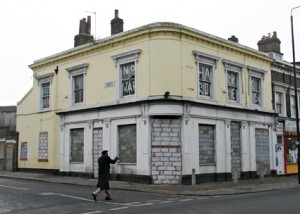A piece written for The Times By Charlie McVeigh, founder of The Draft House
The pub is broken. The trajectory of its long-term decline got steeper yesterday and there is no help at hand. Punch Taverns announced that 1,300 of its 6,700-strong estate have “no future” and will be closed or sold. We are used to hearing that 50-odd pubs a week are disappearing, but if the closures are accelerating soon whole areas of the UK may lose access to draught beer and a community gathering place.
What has gone so horribly wrong? Why are our pubs, once the mainstay of the urban street corner and heart of every village, no longer viable? The death of some is inevitable. Noone is going to suggest that we suspend the drink-driving laws which have killed off any inn unfortunate enough to be situated on an A Road roundabout (‘one for the road, anyone?’). But what of the rest? Why is the pub dying?
The pricing model is broken – supermarket booze is too cheap. The supermarkets routinely use beer as a “traffic driver”, selling it below cost price to draw in customers for their weekly shop. Asda was recently selling 20 tins of Stella Artois for £9 (hope your fridge is big enough). And a price war in 2007 saw own-branded beer for sale for as little as 22p a tin – David Cameron’s much-quoted “20 tins for a fiver”. Leaving aside the appalling social and health impact of unsupervised drinking at these prices, how can the hard-pressed pub-goer justify £2.50 or more per pint against this backdrop?
The regulatory environment is broken. The smoking ban has alienated many customers. Hard-pressed independent landlords (surely the future of the industry) are swamped by bureaucracy and box-ticking unmanageable for a small business without access to an HR department. Last week yet another set of new rules, passed by the last government, came into effect stipulating that all pubs must offer wine by the 125ml measure – by law. This means new menus and glassware for a measure that research shows nobody wants.
The pub ownership model is broken. Brimming with free market zeal the Tories forced the breweries to sell off their pubs in the 1980s. The dogma of the day said it was anti-competitive that pub tenants had to buy beer exclusively from their brewery owners. Fuelled by oceans of debt (Punch Taverns, for example, owes more than £3 billion, or £464,000 per pub) smart City types formed the ‘PubCos’ which acquired these estates. But the insanity is that the ‘tie’ which obliges the tenant to buy beer from its landlord, remained in place in the majority of instances. So now most pubs are not only paying large rents, but also have to buy their beer at grossly inflated prices from their landlord, prices which if charged by a supermarket would cause a customer to shop elsewhere.
Pubs themselves are broken. Challenges arising from supermarket pricing, regulation and punitive leases all have a cost. And that cost is a poor selection of the cheapest brands of beer, ‘ready’ meals, poorly trained staff and management, delayed refurbishment, increasingly desperate price promotions and so on. In other words, a disheartening experience for the customer creating a spiral of decline, leading sooner or later to yet another closure statistic.
Pub owners and staff up and down the country, if they have got this far, will be cursing me for the calumny I heaped upon the industry in the last paragraph. And of course there are many honourable exceptions. Prosperous metropolitan and suburban areas still support a thriving, well-run, increasingly food-led pub trade. Pubs are not closing in these areas. I know from bitter experience how difficult it is to buy licensed sites in Notting Hill, Mayfair or Islington.
But we are talking about pubs in non-thriving areas, i.e. much of the country outside the prosperous South East. What’s the recipe for revival? This is a crisis, and emergency measures must be taken.
Government has a big part to play, loath though I am to admit it. Nowhere is the bonfire of regulation more needed than in our trade. Tax on draught beer should be slashed and a minimum price for alcohol set – Tesco boss Sir Terry Leahy asked for this himself this year. Business rates must be reduced (ours were up by as much as 25% this year).
The hardest nut to crack will be reform of pub ownership. But crack it we must and brighter minds than mine must help. The high rents and tied leases set by PubCos must be stopped. Currently the PubCos cannot change lease terms because of loan covenants. With heavy debts and fewer customers it is in their interests to find a better way to do business. The government may have to step in too, they own the banks after all. The goal must be to make pub ownership and attendance affordable for everyone, everywhere in Britain.

